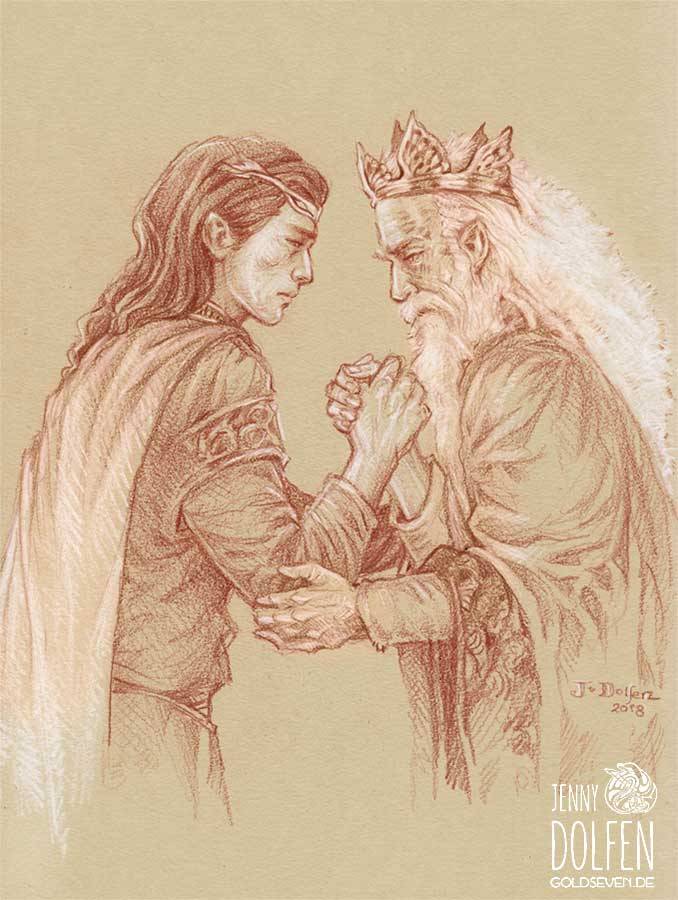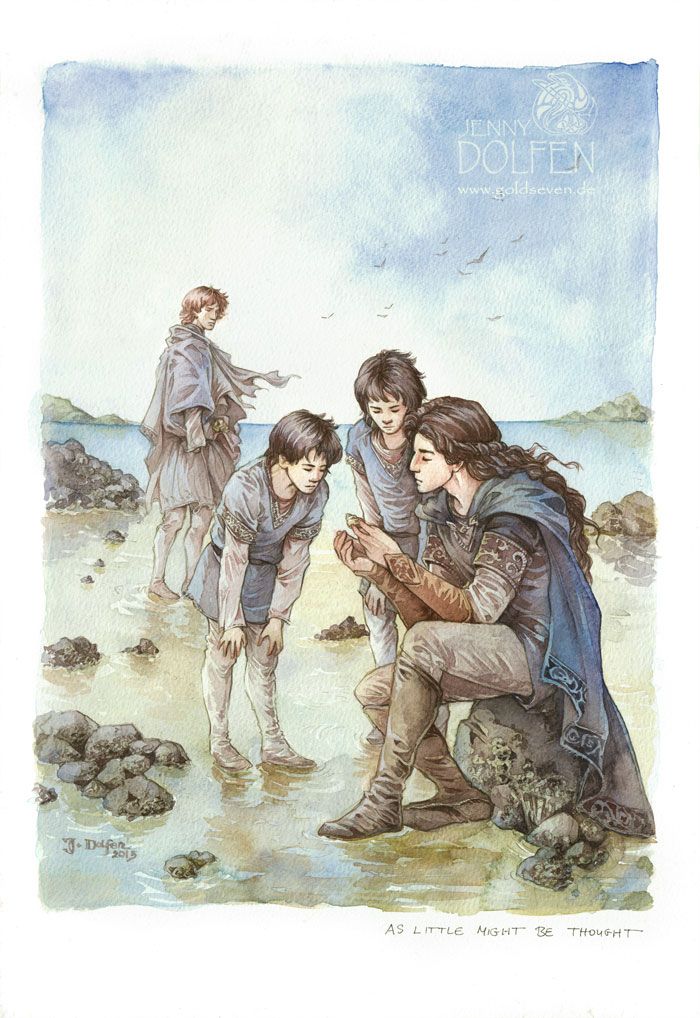In this biweekly series, we’re exploring the evolution of both major and minor figures in Tolkien’s legendarium, tracing the transformations of these characters through drafts and early manuscripts through to the finished work. This installment looks at Elrond Half-elven, the Lord of Rivendell and a behind-the-scenes player in many of Middle-earth’s most significant tales.
Elrond is one of those characters who just seems to have a finger in every pie. He’s the son of Eärendil, one of Middle-earth’s icons, and is thus the descendant of a Maia (Melian) and a number of legendary figures, including Beren and Lúthien. He’s ruled Imladris for many lifetimes of men; he married the daughter of Galadriel, the most powerful Eldar of the Third Age; he played foster-parent to the majority of the heirs of Elendil; his brother founded the Númenorean line; and his daughter marries the returning king of Gondor and Arnor. On the other hand, however, Elrond never lands the starring role. He’s there as a sort of sidenote in The Hobbit: a rest station along the way, a font of wisdom and guidance for a ragtag fellowship with great expectations and very little sense. Even in The Lord of the Rings he lingers on the fringes of the tale, playing gracious host and learned moderator, but largely acting behind the scenes. When telling the stories of the Last Alliance, his own presence is cast as almost incidental: he is Gil-galad’s herald and poet—his assistant, as it were. The grief, joys, trials, and triumphs of Elrond are always seen from a distance, or darkly, as through a veil.
At first glance, this might suggest that Elrond simply doesn’t cut it as a person of interest—that he’s flat, filler, a mere foil for characters whose tales and lives, in the long run, matter more. But, as might be expected given the existence of this article, that’s not the case. At least, it’s not entirely the case. Let me explain.
In the early days of Elrond’s existence, Tolkien had great plans for him. At various moments Elrond rules “the West of the world” (The Lost Road, hereafter LR, 158); is husband to Galadriel (The Treason of Isengard, hereafter TI, 236); is an only child (LR 25); personally assaults Thû (Sauron) as a core member of the Last Alliance; single-handedly defeats the Witch-king of Angmar (The Peoples of Middle-earth, hereafter PM, 195); and is the founder and first king of the Númenorean line (LR 27). In many cases, he actually chooses to embrace his mortality and remain among Men in Arda because of the great love he has for that people (LR 25)! It’s through Elrond, Tolkien writes, that the blood of Elves and Maiar enter into the lineage of humanity, forever transforming the shape of history (The Shaping of Middle-earth, hereafter SM, 194). In early drafts of The Lord of the Rings, Elrond is even directly offered the Ring, much like Galadriel in the published version (The Return of the Shadow, hereafter RS, 396). At one point, Tolkien even called Elrond’s daughter Finduilas, which, as we saw with Denethor last time, is a name that carries some very specific connotations, setting us up for a story careening into disaster and despair.
But gradually, Elrond’s role diminishes. His involvement in Númenor sounds a lot like his brother Elros’s, doesn’t it? That’s because in many cases, Tolkien did little more to the drafts than swap out their names: Elrond to Elros: the change is simple, but the course of brotherhood never did run smooth. One brother always seems to get the short end of the stick in Tolkien’s tales.
Not that this is precisely true about Elrond. He’s certainly more active and present in Middle-earth than Elros. But more often than not, we hear about Elrond’s involvement rather than seeing it. After the narrow escape at the Ford, Gandalf tells Frodo that Elrond has tended him night and day, for example. We know from various sources that Elrond raised Aragorn as a son. Elrond’s power, enhanced by the elven ring Vilya, makes Imladris one of the few remaining safe havens in Middle-earth—it’ll be one of the very last, and perhaps the last, to fall to Sauron. Elrond is a member of the White Council, and even men excessively wise in their own estimations (here’s looking at you, Denethor) seek out his advice. He hangs out with wizards and lords of the Noldor, is related to Arda’s most powerful families, and fosters kings. The blood of gods run through his veins. What more could you ask of a guy?
The problem is, of course, that Elrond is strangely absent from his own stories. Throughout the drafts, the Lord of Rivendell gradually loses agency because his stories are framed and re-framed as things of a half-forgotten age. Again and again, the things he loves slip away from him into the past. As a child, he sees his community slaughtered by the sons of Fëanor, his parents leave on a desperate mission to the Valar, never to return, and he is taken in by a repentant Maglor—who before long is also gone. Elrond loses his lord, Gil-galad. His wife, Celebrian, is captured by Orcs and tormented in unimaginable ways. Though she’s finally rescued, the trauma of her experience cannot be assuaged and she seeks solace in the West, leaving Elrond and their children on the hither shores (PM 236). He watches as the world around him grows and changes, as his chosen people fade and dark powers rage over the torn earth. He sees his beloved daughter choose what might very well be eternal separation from her family—something he’s already had to endure as he watched his twin brother grow old and finally die.

But, significantly, Elrond’s story doesn’t only revolve around loss. In fact, it represents the beautiful, intricate dance between movement and preservation that is so central to Tolkien’s work as a whole. Watch carefully.
First, the House of Elrond is a place of remembrance. There in the Hall of Fire old tales are sung and recalled and written anew; Elrond himself is in many cases the only one who remembers ancient tales in their entirety. Rivendell promotes this and, in many ways, exists for that purpose. It’s where Bilbo goes to finish his book and where maps and legends are collected and stored. As such it functions as one of Middle-earth’s important centers of learning and people from all about flock to it and to its lord as a source of wisdom in troubling times. It might seem coincidental that representatives from the Elves, Dwarves, Men, and Hobbits all show up in Rivendell at the same general time, but it’s really not all that surprising. Rivendell is fulfilling one of its primary functions as a source of information, almost like a monastery would have during medieval times.
Secondly (and this is closely related), Rivendell is the “Last Homely House.” It’s a place of refuge and respite, and Elrond is a gracious and hospitable host. His home is a vibrant and welcoming community that becomes, in The Lord of the Rings, a place where persons of radically different cultures, histories, and races can gather around a table and share stories in a respectful environment that takes their perspectives into account as integral parts of a larger whole. Furthermore, it’s served as the means of preservation for the heirs of Elendil and the heirlooms of their house for generations. And not only that—Elrond is a healer who takes a vested interest in the well-being and peace of his guests. Rivendell is a safe place. A place of calm and restoration in a shattered world.
But it’s not disconnected from the outside world. The steady flow of travelers provides lifelines to the rest of Middle-earth, and Elrond himself is constantly working behind the scenes (often with powerful figures like Gandalf and Galadriel) to influence all he can for the future good (The War of the Ring, hereafter WR, 274). And, as I said earlier, he’s watched the world transform around him and has met those changes head-on. He has learned through hard experience Gandalf’s maxim:
[I]t is not our part to master all the tides of the world, but to do what is in us for the succour of those years wherein we are set, uprooting the evil in the fields that we know, so that those who live after may have clean earth to till. What weather they shall have is not ours to rule. (LotR 879)
Elrond bears Vilya, the Ring of the Firmament, and I don’t think that’s an accident. The heavens are often used, especially in medieval literature, as a symbol of perfection, but it’s important to recognize that they are not in stasis. As Tolkien’s tale of the Sun and Moon illustrates, the bodies in the sky are always in motion—and yet, they are also important signs that call us to remember. The Sun and Moon are vessels of the lost light of the Two Trees of Valinor. Elrond’s own father, Eärendil, is an important stellar symbol of both the heartbreaking plight of the Children of Ilúvatar and the Valar’s promise that the world has not been abandoned. Elrond bears on his hand that constant reminder, the weight of balancing both movement and preservation, loss and memory. He himself embodies those eternal cycles of movement, change, memory, and preservation.
Which is no surprise, really… After all, his name means “starry dome.”
Top image: “As Little as Might be Thought,” by Jenny Dolfen
Megan N. Fontenot is a dedicated Tolkien scholar and fan who is fascinated by the dialectic between preservation and change in Tolkien’s work and the impact it has on various characters. Catch her on Twitter @MeganNFontenot1 and feel free to request a favorite character in the comments!










